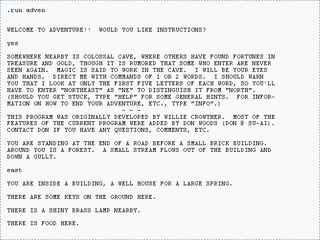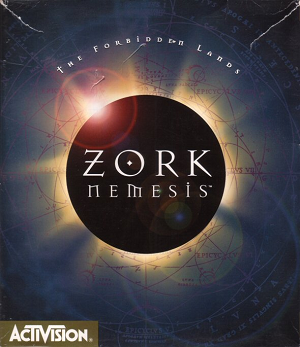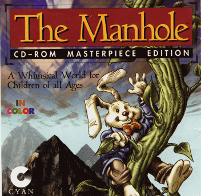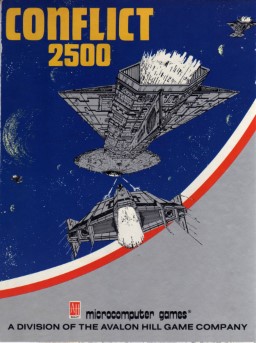Infocom was an American software company based in Cambridge, Massachusetts, that produced numerous works of interactive fiction. They also produced a business application, a relational database called Cornerstone.

Interactive fiction, often abbreviated IF, is software simulating environments in which players use text commands to control characters and influence the environment. Works in this form can be understood as literary narratives, either in the form of interactive narratives or interactive narrations. These works can also be understood as a form of video game, either in the form of an adventure game or role-playing game. In common usage, the term refers to text adventures, a type of adventure game where the entire interface can be "text-only", however, graphic text adventures still fall under the text adventure category if the main way to interact with the game is by typing text. Some users of the term distinguish between interactive fiction, known as "Puzzle-free", that focuses on narrative, and "text adventures" that focus on puzzles.

Zork is a text-based adventure game first released in 1977 by developers Tim Anderson, Marc Blank, Bruce Daniels, and Dave Lebling for the PDP-10 mainframe computer. The original developers and others, as the company Infocom, expanded and split the game into three titles—Zork I: The Great Underground Empire, Zork II: The Wizard of Frobozz, and Zork III: The Dungeon Master—which were released commercially for a range of personal computers beginning in 1980. In Zork, the player explores the abandoned Great Underground Empire in search of treasure. The player moves between the game's hundreds of locations and interacts with objects by typing commands in natural language that the game interprets. The program acts as a narrator, describing the player's location and the results of the player's commands. It has been described as the most famous piece of interactive fiction.

Activision Publishing, Inc. is an American video game publisher based in Santa Monica, California. It serves as the publishing business for its parent company, Activision Blizzard, and consists of several subsidiary studios. Activision is one of the largest third-party video game publishers in the world and was the top United States publisher in 2016.

Steven Eric Meretzky is an American video game developer. He is best known for creating Infocom games in the early 1980s, including collaborating with author Douglas Adams on the interactive fiction version of The Hitchhiker's Guide to the Galaxy, one of the first games to be certified "platinum" by the Software Publishers Association. Later, he created the Spellcasting trilogy, the flagship adventure series of Legend Entertainment. He has been involved in almost every aspect of game development, from design to production to quality assurance and box design.

Return to Zork is a 1993 graphic adventure game in the Zork series. It was developed by Activision and was the final Zork game to be published under the Infocom label.

Pitfall! is a video game developed by David Crane for the Atari Video Computer System and released in 1982 by Activision, Inc. The player controls Pitfall Harry, who is seeking treasure in a jungle with a 20 minute time limit. The game world is populated by enemies, such as snakes and scorpions, and hazards including quicksand and logs which variously cause the player to lose lives or points.
Katherine Anna Kang is an American video game designer.

Zork Nemesis: The Forbidden Lands is a graphic adventure game developed by Zombie LLC, published by Activision, and released in 1996 for Windows 95, MS-DOS, and Macintosh. It is the eleventh game in the Zork series, and the first title not to be marketed under the Infocom label, while featuring a darker, less comical story within the Zork setting. The story focuses on players investigating the sudden disappearance of four prominent figures and their children to the hands of a mysterious being known as the "Nemesis", and uncovering a sinister plot during their investigations that they must thwart. The game features performances by Lauren Koslow, W. Morgan Sheppard, Allan Kolman, Stephen Macht, Paul Anthony Stewart, Merle Kennedy, and Bruce Nozick.

Graeme Devine is a computer game designer and programmer who co-founded Trilobyte, created bestselling games The 7th Guest and The 11th Hour, and helped design id Software's Quake III Arena. He was Chairman of the International Game Developers Association (IGDA) from 2002–2003. One of Graeme's trademarks is his Scooby-Doo wardrobe. He has said of his work that "I've not stuck to any one genre, platform or IP throughout my career, and I hope people eventually work out that's just fine."

The Manhole is an adventure video game in which the player opens a manhole and reveals a gigantic beanstalk, leading to fantastic worlds.

EA Mobile Inc. is an American video game development studio of the publisher Electronic Arts (EA) for mobile platforms.

Marc Blank is an American game developer and software engineer. He is best known as part of the team that created one of the first commercially successful text adventure computer games, Zork.

Quicksilver Software, Inc. was founded on May 1, 1984, by three former Mattel Electronics programmers: Bill Fisher, Stephen Roney, and Mike Breen. The company specializes in the creation of strategy, simulation, and educational products, and on focused high-technology R&D projects.

Martin Cooper is an American engineer. He is a pioneer in the wireless communications industry, especially in radio spectrum management, with eleven patents in the field.
Civilization is a series of turn-based strategy video games, first released in 1991. Sid Meier developed the first game in the series and has had creative input for most of the rest, and his name is usually included in the formal title of these games, such as Sid Meier's Civilization VI. There are six main games in the series, a number of expansion packs and spin-off games, as well as board games inspired by the video game series. The series is considered a formative example of the 4X genre, in which players achieve victory through four routes: "eXplore, eXpand, eXploit, and eXterminate".

Star Trek: Voyager – Elite Force is a first-person shooter video game developed by Raven Software and published by Activision. The game was originally released on September 15, 2000 for Windows and Mac OS. A port for Mac OS developed by Westlake Interactive and published by Aspyr Media was released on November 20, 2002. Elite Force was ported to the PlayStation 2 by Pipe Dream Interactive and published by Majesco Entertainment on December 11, 2001.
Video gaming in Finland consists of video game industry of 260 active video game developer studios, roughly a dozen professional players and countless enthusiastic amateurs.

Conflict 2500 is video game published by Avalon Hill in 1981 for the Apple II, Atari 8-bit family, Commodore PET, and TRS-80.














